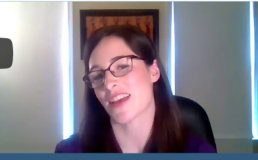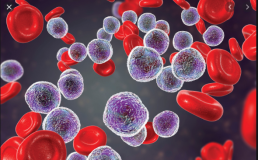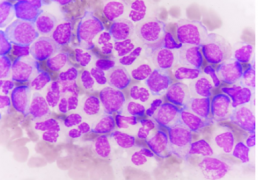Cohen Expands on Treatment Options in Patients With Genomic Aberrations in CLL
Cohen Expands on Treatment Options in Patients With Genomic Aberrations in CLL
This article was originally published by Targeted Oncology
During a virtual Case Based Peer Perspective event, Jonathon B. Cohen, MD, MS, the codirector of the Lymphoma Program, medical director of Infusion Servies, and associate professor in the Department of Hematology and Medical Oncology at Emory University School of Medicine and Winship Cancer Institute, discussed a case of a 71-year-old woman diagnosed with chronic lymphocytic leukemia.
Targeted Oncology™: What are reasonable treatment options to consider in a patient with CLL?
COHEN: The National Comprehensive Cancer Network guidelines offer 6 treatment options for patients with del(17p).1 As I tell my fellows when I work with them, if you ever see a list of preferred regimens with 6 options, that likely means that nobody really knows what the best option is.
The 1 option not listed in the guideline is chemotherapy, especially in the relapsed setting for patients with del(17p). I generally would not use chemotherapy.
The only exception to that might be a situation where we have a patient who’s young and for whom we’re thinking about moving on to something like an allogeneic transplant or some other definitive therapy. We might consider using chemotherapy for a cycle or 2. But otherwise, if you’re not going in that direction, that’s the 1 thing we do feel comfortable saying—that is, that chemotherapy is probably not the right option.
FDA Clears clonoSEQ to Detect MRD in Chronic Lymphocytic Leukemia
FDA Clears clonoSEQ to Detect MRD in Chronic Lymphocytic Leukemia
This article was originally published by AJMC
Adaptive Biotechnologies received its third approval from the FDA for the use of its next-generation sequencing assay to detect minimal residual disease (MRD) in chronic lymphocytic leukemia (CLL).
The assay, clonoSEQ, uses a proprietary immunosequencing platform to monitor for MRD, where a small number of cancer cells remain during and after treatment. It is difficult to detect without precise, sensitive tools, and can lead to a recurrence of disease.
The approval follows a decision by CMS in January to pay for cloneSEQ testing for CLL, in addition to multiple myeloma and B-cell acute lymphoblastic leukemia. Nearly 80% of US patients with CLL are age 65 or over.
Continue reading this article on AJMC
Experts Outline Best Practices in the Treatment of Chronic Lymphocytic Leukemia
Experts Outline Best Practices in the Treatment of Chronic Lymphocytic Leukemia
This article was originally published by Pharmacy Times
Chronic lymphocytic leukemia (CLL) is a cancer of the blood and bone marrow that can be treated to extend the life of some patients even by decades. Treatments and best practices are developing rapidly and health care providers need to stay up to date on all relevant information. In a Pharmacy Times Insights video series, a panel of experts discussed how to best treat and monitor patients living with CLL.
The panel included Alison Duffy, PharmD, BCOP, an associate professor and clinical pharmacy specialist in oncology at the University of Maryland School of Pharmacy and Cody Steeves, PharmD, BCOP, a clinical pharmacist for Biologics by McKesson.
Both intravenous (IV) and oral CLL medications are available, each with their own benefits and disadvantages. A combination method is also used by many patients, but that also presents a unique set of challenges.
“Some of the economic challenges we’ve seen have been the timely approval of the oral and the IV therapy together because of pharmacy benefits and medical benefits, and so that can be a challenge, especially if a patient’s disease is very aggressive. If they have progressed on ibrutinib it would be really important to start their subsequent therapy very quickly, or it can progress to Richter transformation,” Duffy said. “The economic challenges in improving can be a barrier. As pharmacists, anything we can do to facilitate the approval process, and in the clinic, I can certainly help with the prior authorization process.”
Experts Discuss Treatment Advances for Chronic Lymphocytic Leukemia
Experts Discuss Treatment Advances for Chronic Lymphocytic Leukemia
This article was originally published by Pharmacy Times
In the Pharmacy Times ® Directions in Oncology™ Insights series on chronic lymphocytic leukemia (CLL), experts Alison Duffy, PharmD, BCOP, and Cody Steeves, PharmD, BCOP, discussed current treatment recommendations and what is next for the disease state.
CLL is a rare cancer of the blood and bone marrow, and although it is difficult to treat many advances have been made in the past 6 years, said Duffy, an associate professor, clinical pharmacy specialty in oncology at the University of Maryland School of Pharmacy.
Earlier recommendations included single-agent chemotherapy or single-agent monoclonal antibodies, but Duffy explained that patients are increasingly receiving small molecule inhibitors, including Bruton tyrosine kinase (BTK) inhibitors.
Without the use of single-agent chemotherapies or single-agent monoclonal antibodies, Duffy said pharmacists can see patients with CLL in many settings.
“Using those as single agents, or more commonly in combination, that’s where the pipeline and future directions are really moving towards, with combination therapy as well as more potent, more selective, targeted therapies,” she said.
According to recommendations from the National Comprehensive Cancer Center (NCCN), Duffy said some current frontline treatment agents include ibrutinib, venetoclax plus obinutuzumab, acalabrutinib with or without obinutuzumab, and chemo-immunotherapy, when warranted.
Frontline therapies present various challenges, although Duffy said the treatment criteria has become less rigid.
“Some of the things that I would think about would be age, fitness, comorbidities such as atrial fibrillation, and renal function if I was going to give something like fludarabine within the FCR [fludarabine, cyclophosphamide, and rituximab] regimen,” Duffy said.
She added that considering patient preferences and clinical experiences is important. Some patients may not be great candidates for oral therapy due to a lack of access, finance, comfort level, or adherence challenges. Similarly, transportation might be an issue for patients receiving intravenous chemotherapy and should be considered.
“Moving forward, it’s positive to see that the outcomes, when they’re stratified by those patients with the deletions, still tend to trend in the positive direction for those patients with these newer oral therapies we’ve had over the past 5 or 6 years,” Steeves said.
The experts also turned their attention to minimum residual disease (MRD) testing and how it affects the use of limited duration therapy. MRD testing is particularly helpful for diseases that require stronger treatments, Steeves said. He explained that some data has found that obtaining a low or negative MRD corresponds with significantly increased progression-free survival compared with medium or high levels of MRD. However, patients receiving oral agents, especially single-agent BTK inhibition alone or with a CD20 inhibitor, are not expected to achieve MRD. Despite the lack of MRD, Steeves said these agents can be valuable.
“Even though we’re not seeing those deep remissions with MRD negativity, undetectable MRD, we certainly are still seeing a large benefit of using these agents without that,” Steeves said.
Steeves, clinical oncology pharmacist, Biologics by McKesson, also emphasized the importance of a patient-specific treatment plan. Some patients may want to take the drug for as short a period as possible, while others find that it does not disrupt their daily lives to a large extent because they are already receiving multiple medications.
Finally, Duffy and Steeves turned their attention to BTK inhibitor monotherapy for patients with newly diagnosed CLL. Ibrutinib, a new BTK inhibitor, was investigated in the RESONATE trial (NCT01578707), which found long-term benefit of the drug upon 6-year follow-up. The trial also established ibrutinib as the first-line choice for older patients and those without a 17P deletion, thereby demonstrating significant progression-free survival benefit among those high-risk subgroups. However, Duffy noted that ibrutinib is not for everybody.
“If you have a patient with uncontrolled atrial fibrillation, who has a high risk of bleeding that can’t be mitigated, or uncontrolled hypertension despite optimizing therapy management, ibrutinib wouldn’t be my first choice,” Duffy said.
Although the various treatments all need to be evaluated based on unique patient needs, the recent developments for the treatment of CLL are very promising and exciting, Duffy concluded.
“We’re getting to have a better understanding of CLL biology and some of the prognostic indicators,” Duffy said. “These new therapies allow for treatment without some of the traditional chemotherapy agents.”
THE PHARMACY TIMES® DIRECTIONS IN ONCOLOGY™ INSIGHTS SERIES ON CLL CAN BE VIEWED AT WWW.PHARMACYTIMES.COM/INSIGHTS.
Immunoglobulin Abnormalities Do Not Affect Overall Survival in CLL, Study Finds
Immunoglobulin Abnormalities Do Not Affect Overall Survival in CLL, Study Finds
This article was originally published by AJMC
Patients with chronic lymphocytic leukemia (CLL) who have immunoglobulin (Ig) abnormalities at diagnosis have shorter treatment-free survival (TFS) periods, but do not have shorter overall survival (OS), according to a new study.
The report, published in the British Journal of Hematology, sheds new light on the ways in which qualitative and quantitative gammaglobulin abnormalities affect—and do not affect—the prognosis of patients with MM.
A team of investigators, including corresponding author Luca Laurenti, MD, of Gemelli University Hospital, in Italy, noted that prior research has looked at the impact of hypogammaglobulinemia in patients with CLL. However, they said there is significant heterogeneity between cohorts, and much research has included both treated and untreated patients, making it difficult to examine the prognostic impact of such abnormalities.
In an effort to get a clearer picture of the impact, the investigators examined 1505 patients with CLL and split them into 4 cohorts based on the degree of Ig aberrations upon diagnosis. The vast majority (1083) had normal Ig levels, making up the largest of the 4 groups. The other 3 groups included 73 patients with IgM monoclonal gammopathy (IgM/CLL), 149 patients with IgG monoclonal gammopathy (IgG/CLL), and 200 patients with hypogammaglobulinemia (hypo-c).
“IgM paraprotein was significantly associated with a more advanced Binet/Rai stage and del(17p)/TP53 mutation, while IgG abnormalities correlated with a higher occurrence of trisomy 12,” the authors said.
Any type of Ig abnormality lowered a patient’s expected TFS, Laurenti and colleagues found, but there was not a corresponding statistically significant impact on OS.
The authors noted that hypogammaglobulinemia specifically has been linked in the past with higher infections and morbidity. Thus, Ig replacement therapy, which was not investigated in this study, is indicated by current guidelines for the management of patients with CLL.
“However, some studies suggest that hypogammaglobulinemia is not associated with a higher risk of death from infections, but rather with a shorter TFS and a higher risk of death from all causes, being primarily a marker of greater tumor burden and reflecting a more aggressive disease,” Laurenti and colleagues wrote.
This hypothesis is supported by the current study, they said.
More broadly, the authors said their 28% rate of Ig abnormalities fell somewhere in the middle of rates reported in existing research, which ranged from 7% to a high of 80%. The investigators also reported that the proportion of patients with each type of abnormality held generally steady across the 4 cancer centers in the study. However, the authors said the rates were somewhat of a surprise.
“Even though we did not perform any characterization of the heavy-chain isotype and considering that CLL cells express breakpoint cluster region proteins (BCRs) mostly of IgM and IgD isotypes, rather than the IgG class, IgM paraprotein was expected to be more frequent but instead the occurrence of IgG monoclonal component was even double than that of IgM,” the authors said.
In conclusion, the authors said while other factors such as IGHV status mutation, Binet/RAI stage, and del17p are known prognostic factors for OS, “Ig alteration does not have any impact on OS.”
CLL Advocates NZ Newsletter Issue 2
CLL Advocates NZ Newsletter Issue 2
A number of you will be familiar with and regularly reading HealthUnlocked and Patient Power, two patient support and networking services (based in the UK and US respectively) that cover CLL in detail.
For those not yet in the habit, I can recommend both websites to CLL patients, and their families and supporters. You can access both through our website on our useful links page here, or go directly to Patient Power here and HealthUnlocked here. Access is free.
HealthUnlocked is published daily, with ten articles in each edition, that are mainly personal stories and discussion among people with CLL, and also occasional reviews of CLL-related clinical studies.
One such study, in the 20 July edition was on CLL and Covid 19. It provided an analysis of the assessment of 190 patients with CLL who had proven Covid 19 infection. Most presenting for analysis (79%) were in the “severe” category (requiring ICU admission and/or oxygen). This is likely to be related to their having had contact with a hospital. One third of these patients died of Covid 19. The severe group were older than the less severe group, so increasing age is a risk. There was a reduced rate of severe disease in those patients who had had treatment recently as opposed to those who had treatment remotely, or never.
Patient Power (PP) sends email updates to subscribers, generally weekly. Their CLL articles tend to have more of a scientific and medical focus. They also regularly post videos of interviews conducted by the PP CEO, Andrew Schorr, who is a long-term CLL survivor. He interviews well known clinicians on aspects of CLL, including the latest research and developments in the understanding and treatment of CLL. His wife, Esther, also writes regularly for PP.
An interesting recent PP article discussed CAR T-cell treatment, which is being trialled for CLL in research centres globally, including the Malaghan Institute in Wellington (Dr Rob Weinkove).
As an aside on CAR T-cell therapy, I recently enjoyed a book by NZ comedian David Downs on his experience with cancer (in his case, lymphoma). The book is entitled “A Mild Touch of the Cancer”. It is humorous and insightful on living with a serious health issue, and I commend it to you.
Finally, if you haven’t already seen it, check out our message on Facebook and on our website about our first CLL education event, to be held in Auckland, on Wednesday 14 October 2020. The event will be jointly hosted with Leukaemia & Blood Cancer. For those unable to be there in person, you’ll be able to join us via Zoom, to hear talks by and discussion with three of our country’s foremost CLL clinicians. As well as providing the latest information on CLL we hope to extend our reach and ability to support people living with CLL, and I warmly encourage you to help spread the word and attend the event with your family and supporters. More detail on the event including how to register will be circulated soon.
With best wishes
Neil Graham FRACP, FRCP
Executive Director
CLL Advocates NZ
Genetic Prognostic Factors in CLL Treated With Novel Compounds
Genetic Prognostic Factors in CLL Treated With Novel Compounds
This article was originally published by Cancer Therapy Advisor
Treatment with obinutuzumab plus venetoclax (VenG) was associated with improved outcomes compared with obinutuzumab plus chlorambucil (CGlb) among patients with chronic lymphocytic leukemia (CLL) and established unfavorable genetic factors, according to a study published in Blood.1
“Genetic parameters are established prognostic factors in chronic lymphocytic leukemia (CLL) treated with chemoimmunotherapy, but are less well studied with novel compounds,” the authors wrote.
Unmutated IGHV, mutated TP53, and deletion of chromosome 17p (del[17p]) that contains the TP53 locus, are associated with progression and shorter survival among patients with CLL treated with chemoimmunotherapy. Other genetic markers have been identified that are also prognostic for outcomes.
This analysis used data from the multicenter, phase 3 CLL14 trial, which randomly assigned 432 patients with CLL to receive first-line VenG or CGlb. The analysis used fluorescence in situ hybridization (FISH), DNA sequencing, and next-generation sequencing to evaluate genetic prognostic factors.
CLL Experts Favor Social Distancing, but Vary on Treatment Continuation Amid Pandemic
CLL Experts Favor Social Distancing, but Vary on Treatment Continuation Amid Pandemic
This article was originally published by AJMC
The survey is the latest attempt to figure out how best to manage patients with CLL amid the pandemic, given that patients with the cancer tend to be older in age, have comorbidities, and be immunosuppressed.
In a letter to the editor of the American Journal of Hematology, corresponding author Mazyar Shadman, MD, MPH, of the Fred Hutchinson Cancer Research Center, in Seattle, and colleagues reported on a survey sent to 62 CLL specialists in the United States, Canada, Europe, and Australia. Of those, 59 responded to at least 1 question, and 44 completed the entire survey.
When asked about social distancing recommendations for patients with CLL, 32% said they would advise patients to follow the same guidelines as the WHO and Centers for Disease Control and Prevention (CDC) recommend for the general public. Twenty-one percent said they would advise patients to follow those guidelines but also limit regular outings by asking friends to pick up groceries or medications for them. Another 35% went even further, saying patients with CLL should avoid work, even if they are essential workers. The remaining 12% said they would recommend all of the above, plus wearing N95 masks and gloves outside of the house.
In terms of testing, most experts said it was not necessary to test all patients with CLL for COVID-19. Specifically, 62% of experts said they would limit testing to patients who call to and report symptoms, and another 9.5% said tests should be limited to patients who come in for an office visit and report symptoms.
Still, while clinicians generally had a low bar for what types of symptoms warranted testing. “Most favored testing patients with any levels of reported symptoms, even with limited testing availability,” Shadman and colleagues wrote. “With unlimited access, 23% recommended universal testing.”
Though their approaches to social distancing and testing were in line with recommendations for the general public, the experts expressed caution when it came to continuation of outpatient therapy. Only 14% said CLL therapy should be continued unconditionally. Most (60.5%) favored treatment discontinuation, and 25.5% said they favored continuation only based on the specific clinical situation.
However, when it came to bruton tyrosine kinase inhibitors (BTKis), such as ibrutinib (Imbruvica) and acalabrutinib (Calquence), the proportion of experts favoring unconditional treatment continuation was much higher, at 44%.
Shadman and colleagues said the more favorable responses concerning BTKi continuation may be due to concern about disease flares if treatment were stopped.
“Also, there is a theoretical benefit of BTKi’s in blunting the hyperinflammatory stage of COVID-19 disease by targeting macrophages and/or inhibiting pro-inflammatory cytokines,” they said.
Most experts (72%) recommended against the use of intravenous immune globulin (IVIG), though the authors noted that the survey was conducted in late March and early April, “before passive antibodies in the gammaglobulin pool would be expected.”
Shadman and colleagues said additional study is warranted to better understand the optimal approach to management of patients with CLL during the pandemic.
Dr. Davids on the Potential Utility of Frontline Ibrutinib/Umbralisib in CLL and MCL
Dr. Davids on the Potential Utility of Frontline Ibrutinib/Umbralisib in CLL and MCL
This article was originally published by OncLive
Matthew S. Davids, MD, MMSc, an associate director with the Center for Chronic Lymphocytic Leukemia; director of clinical research, Lymphoma Program; and medical oncologist, Dana-Farber Cancer Institute; and an assistant professor of medicine at Harvard Medical School, discusses the potential utility of moving the combination of ibrutinib (Imbruvica) and umbralisib into the frontline setting of chronic lymphocytic leukemia (CLL) and mantle cell lymphoma (MCL).
Findings from a phase 1/1b study presented during the 2020 European Hematology Association Annual Congress showed that ibrutinib/umbralisib elicited high response rates in CLL and MCL with a tolerable safety profile.
Updated data from the study revealed that progression-free survival and overall survival did not differ significantly from ibrutinib monotherapy in patients with MCL; however, outcomes were not negatively impacted.
In CLL specifically, the combination may have utility in the post-venetoclax (Venclexta) patient population as venetoclax is being used earlier in treatment, explains Davids.
Moving PI3K inhibitors into the frontline setting has been met with some challenges such as increased immune-mediated toxicities, says Davids.
As umbralisib appears to be a well-tolerated PI3K inhibitor, this combination may have potential utility in CLL, concludes Davids.
A 79-Year-Old Man With Relapsed Chronic Lymphocytic Leukemia
A 79-Year-Old Man With Relapsed Chronic Lymphocytic Leukemia
This article was originally published by Targeted Oncology
High-Risk Chronic Lymphocytic Leukemia
Jeff Sharman, MD: Hello, my name is Jeff Sharman. I’m the Medical Director of Hematology Research for US Oncology, and I am a practicing oncologist at the Willamette Valley Cancer in Eugene, Oregon.
Today I’ve been asked to present a case of a 79-year-old gentleman with relapsed chronic lymphocytic leukemia to address some of the treatment considerations we have in this patient population.
This particular patient is a hypothetical patient but referred to me. We’ll say that he was a 79-year-old gentleman who initially presented to his outside medical oncologist for the first time complaining of some vague intermittent abdominal pain and progressive fatigue. His past medical history is notable primarily for medically-controlled hypertension. He had a myocardial infarction 8 years ago and is on low-dose aspirin. His original CLL diagnosis was about 7 years ago, and after a period of watchful waiting, he had progressive lymphocytosis and adenopathy. He was treated with ibrutinib 420 mg daily, his symptoms improved, and he achieved a stable disease with resolution of lymphadenopathy.
Unfortunately, after 5 years of disease control on ibrutinib, he complained of increasing fatigue and decreasing appetite. Upon physical exam, he had a return of palpable lymphadenopathy, and his spleen was palpable, 4 centimeters below the costal margin. At that time, seen by an outside medical oncologist, he was started on rituximab monotherapy due to his medical comorbidities, but after 6 months on this regimen, he presents to my clinic after moving to be closer to family.
His physical exam was notable this time for palpable bilateral cervical adenopathy, right-sided inguinal adenopathy. Labs showed a white blood cell count of 55,000, predominately lymphocytes, and neutrophil count of 3100. He was anemic and thrombocytopenic, with a hemoglobin of 9.4 and platelets of 90,000, respectively. His beta-2 microglobulin was elevated, and, notably, he had a creatine clearance of just 31 mL per min.
Flow cytometry confirmed the typical immunophenotype for CLL, and at this time, FISH testing was performed and, importantly, returned a deletion of 17p in a high fraction of the cells. He was Rai stage 4 with an ECOG performance status of 1. At this time, treatment was initiated with idelalisib in combination with rituximab, or I should say idelalisib was added to rituximab at this time, 150 mg PO BID.
Now this is an interesting case, and it presents a number of features that are challenging in terms of how to pick therapy in this population with significant comorbidities. I’ve been asked to address questions pertaining to both his prior management, his current situation, and so forth.
The first question I’ve been asked is to describe my initial impression of the case and what the prognosis was for this patient. You know this is a patient who has high-risk CLL. He has relapsed after ibrutinib, and he has a deletion of 17p. What that means is that chemoimmunotherapy is not going to work for this individual, so you really don’t have that much in the way of options. Then you’ve exhausted BTK inhibitors, and there’s a question of what you have left.
In this particular case, the outside provider used rituximab monotherapy probably for lack of clarity in what options might have been available; this is a patient that because of his age and comorbidities, it’s very possible this patient may ultimately pass away of their CLL, which, in contemporary CLL management, seems like a relatively rare occurrence.
When we discuss risk stratification for patients with chronic lymphocytic leukemia, there’s a couple of things that are really important. We think about their IgHV status, which is really a measurement of how quickly the CLL is growing. What are the kinetics of growth? Then we think about the FISH status, which is how resistant it is to therapy. Deletion of 17p is a particularly noteworthy abnormality because patients with 17p have very brief responses to chemoimmunotherapy-based approaches.
Similarly, we’re seeing updates with targeted therapy, such as venetoclax, that 17p can retain adverse prognostic significance in this population. In this particular patient’s case, idelalisib had been added to the regimen. It’s noteworthy that idelalisib outcomes appear to be independent of 17p, so whether 17p is present or not, the outcomes relative to 17p don’t matter quite as much.
Transcript edited for clarity.
Case: A 79-Year-Old Man With Relapsed Chronic Lymphocytic Leukemia
Initial presentation
- A 79-year-old man presented to a new medical oncologist for the first time complaining of vague intermitted abdominal pain, and progressive fatigue
- PMH:
- Hypertension, medically controlled
- MI, 8 years ago, on 81 mg aspirin
- CLL, diagnosed 7 years ago
- After a period of watchful waiting he began treatment with ibrutinib 420 mg PO qDay; symptoms improved and achieved stable disease, resolution of lymphadenopathy
- After 5 years of disease control on ibrutinib he complained of increasing fatigue and decreased appetite, on physical exam there was return of palpable lymphadenopathy; spleen was palpable ~4 cm below costal margin
- He was started on rituximab
- Currently after 6 months on rituximab monotherapy he presents to the clinic
- PE: palpable bilateral cervical and right-sided inguinal lymphadenopathy
Clinical workup
- Labs: WBC 55,000, lymphocyte 82%, ANC 3100/mm3, Hb 9.4 g/dL, plt 90 x 109/L, LDH 220 U/L, Beta-2-microglobulin 3.9 mg/L; creatinine clearance 31 mL/min
- FC CD 5+, CD19+, CD20+ monoclonal B-cell population
- FISH: CLL probe set tested, deletion 17p
- IgHV mutational status: unmutated
- Rai stage IV; ECOG PS 1
- Treatment of idelalisib 150 mg PO BID was added to rituximab








